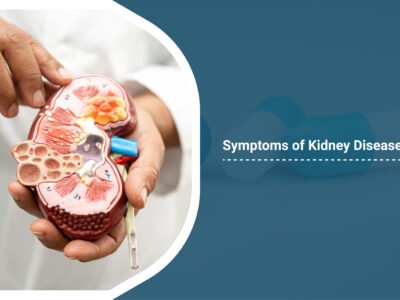Kidney infections, also known as pyelonephritis, are a type of urinary tract infection (UTI) that can lead to severe complications if not promptly treated. Often beginning in the urinary tract, kidney infections can escalate, affecting one or both kidneys. Recognizing the symptoms and seeking timely medical attention is crucial to prevent lasting kidney damage or life-threatening infections. In this blog post, we’ll know the various causes of kidney infections, explore their symptoms, and treatment options.
What is a Kidney Infection?
A kidney infection typically starts in the urethra or bladder before progressing to one or both kidneys. Also referred to as pyelonephritis, this condition necessitates prompt medical treatment to prevent lasting kidney damage or the spread of bacteria to the bloodstream, leading to a potentially dangerous infection.
Symptoms of Kidney Infections:
Kidney infections can present with a range of symptoms, which may include:
- Fever: A high fever is often one of the first signs of a kidney infection, indicating the body’s immune response to the bacterial invasion.
- Chills: Shivering or feeling cold despite a fever is common in kidney infections and may accompany the body’s efforts to fight off the infection.
- Burning sensation or pain during urination: Inflammation of the urinary tract can cause discomfort or a burning sensation during urination.
- Frequent urge to urinate: Individuals with kidney infections may feel the need to urinate more often than usual, even if their bladder is not full.
- Persistent urge to urinate: The urge to urinate may persist even after emptying the bladder, contributing to discomfort and frustration.
- Back, side, or groyne pain: Pain in the lower back, side, or groyne area is a hallmark symptom of kidney infections and may range from mild to severe.
- Nausea and vomiting: Some individuals may experience nausea and vomiting as a result of the infection’s impact on the digestive system.
- Presence of pus or blood in the urine: In severe cases, pus or blood may be visible in the urine, indicating inflammation and possible tissue damage.
- Cloudy or foul-smelling urine: Changes in urine colour or odour may occur due to bacteria and other inflammatory substances.
Causes of Kidney Infections:
Bacterial Invasion:
The primary cause of kidney infections, also known as pyelonephritis, is the invasion of bacteria into the urinary tract, which subsequently travels to the kidneys. Bacteria commonly gain entry into the urinary tract through the urethra, the tube that carries urine from the bladder out of the body. Once inside the urinary tract, bacteria can adhere to the lining of the bladder and multiply, leading to a urinary tract infection (UTI). In some cases, the infection can extend from the bladder to the kidneys, resulting in a kidney infection.
Common Bacterial Culprits:
Among the bacteria responsible for kidney infections, Escherichia coli (E. coli) is the most prevalent. E. coli naturally inhabits the gastrointestinal tract but can migrate to the urinary tract, especially in women due to the shorter urethra, making it easier for bacteria to ascend. Additionally, Klebsiella, another type of bacteria commonly found in the intestines, can also cause kidney infections.
Bloodstream Spread:
In addition to ascending from the urinary tract, bacteria can reach the kidneys through the bloodstream. When a person has an infection elsewhere in the body, such as pneumonia or a skin infection, bacteria can enter the bloodstream (a condition known as bacteremia) and travel to distant organs, including the kidneys. This is known as hematogenous spread. While less common than ascending infections, hematogenous spread can lead to severe kidney infections if left untreated.
Post-Surgical Infections:
Although rare, kidney infections can occur as a complication of kidney surgery or other urinary tract procedures. Surgical interventions involving the kidneys or urinary tract can disrupt the normal anatomical barriers that protect against infection, allowing bacteria to enter and infect the kidneys. For example, kidney stone removal procedures (e.g., lithotripsy) or surgical interventions for kidney tumours may predispose individuals to post-surgical kidney infections. It’s essential for healthcare providers to closely monitor patients post-surgery and administer appropriate antibiotic prophylaxis to reduce the risk of infections.
Kidney infections are primarily caused by bacterial invasion of the urinary tract, with common culprits including Escherichia coli (E. coli) and Klebsiella. These bacteria can enter the urinary tract through the urethra and ascend to the kidneys, causing infection. Additionally, bacteria from infections in other parts of the body can spread to the kidneys through the bloodstream. While kidney infections are typically associated with ascending bacterial infections, they can also occur as rare complications of kidney surgery or other urinary tract procedures. Prompt diagnosis and treatment are essential to prevent complications and promote recovery in individuals with kidney infections.
Risk Factors for Kidney Infections:
Various factors increase the risk of developing a kidney infection, including:
- Gender: Women are at higher risk due to the shorter urethra, which allows bacteria easier access to the bladder and kidneys.
- Urinary tract blockages: Anything that obstructs the flow of urine or makes it harder to empty the bladder can raise the risk of a kidney infection.
- Weakened immune system: Conditions such as diabetes and HIV/AIDS weaken the immune system, making individuals more susceptible to infections.
- Nerve or spinal cord damage: Nerve damage can interfere with bladder function, making it difficult to detect and treat urinary tract infections.
- Use of urinary catheters: Catheters increase the risk of bacterial colonisation in the urinary tract, leading to infection.
- Conditions causing urine reflux: Vesicoureteral reflux, where urine flows back into the kidneys, increases the risk of kidney infections, particularly in children.
Complications of Kidney Infections:
If left as it is, kidney infections can lead to serious health issues, including:
- Kidney scarring: Chronic kidney infections can cause scarring of the kidney tissue, leading to impaired kidney function and potentially chronic kidney disease.
- Blood poisoning (septicemia): Bacteria from the kidney infection can enter the bloodstream, causing a systemic infection known as septicemia, which can be life-threatening.
- Pregnancy complications: Pregnant women with kidney infections are at increased risk of premature birth, low birth weight, and other pregnancy complications.
Treatment for Kidney Infections
Treatment typically involves
Course of Antibiotics:
The cornerstone of treatment for kidney infections is a course of antibiotics aimed at eradicating the bacterial infection. Antibiotics work by targeting and killing the bacteria responsible for the infection, thereby alleviating symptoms and preventing complications. The choice of antibiotic is based on several factors, including the severity of the infection, the type of bacteria involved, and any underlying health conditions or allergies the patient may have.
For uncomplicated kidney infections, oral antibiotics are often prescribed. Commonly used antibiotics for the treatment include:
- Fluoroquinolones: Such as ciprofloxacin or levofloxacin.
- Trimethoprim-sulfamethoxazole: Also known as TMP-SMX or Bactrim.
- Cephalosporins: Such as ceftriaxone or cephalexin.
- Penicillins: Such as amoxicillin or ampicillin.
The duration of antibiotic therapy typically ranges from 7 to 14 days, depending on the severity of the infection and the patient’s response to treatment. Patients must complete the full course of antibiotics as prescribed by their healthcare provider, even if symptoms improve before the medication is finished. Failure to complete the course of antibiotics can lead to treatment failure and the development of antibiotic-resistant bacteria.
Intravenous Antibiotics:
In severe cases of kidney infection or if complications arise, hospitalisation may be necessary for intravenous (IV) antibiotic therapy. IV antibiotics are administered directly into the bloodstream, allowing for more rapid and effective delivery of the medication to the site of infection. Hospitalisation also provides the opportunity for close monitoring of the patient’s condition and response to treatment.
Intravenous antibiotic therapy may be required in the following situations:
- Severe symptoms: Such as high fever, persistent vomiting, or severe pain.
- Complications: Such as sepsis (bloodstream infection), kidney abscess, or urinary tract obstruction.
- Underlying health conditions: Such as diabetes, immunosuppression, or kidney impairment, may necessitate more aggressive treatment.
During hospitalisation, patients may receive a combination of IV antibiotics tailored to the specific bacteria causing the infection. Antibiotic therapy is typically continued until the patient’s symptoms improve, and laboratory tests indicate the resolution of the infection. In some cases, additional imaging studies, such as ultrasound or CT scan, may be performed to assess the extent of kidney involvement and guide treatment decisions.
Supportive Care:
In addition to antibiotic therapy, supportive care measures may be implemented to manage symptoms and promote recovery. These measures may include:
- Pain management: With analgesic medications to alleviate discomfort, such as nonsteroidal anti-inflammatory drugs (NSAIDs) or opioids.
- Fluid and electrolyte balance: Maintaining adequate hydration and electrolyte levels to support kidney function and prevent dehydration.
- Rest and nutrition: Encouraging rest and a balanced diet to support the body’s immune response and facilitate healing.
- Monitoring: Regular monitoring of vital signs, urine output, and laboratory parameters to assess response to treatment and detect any complications.
Prevention of Kidney Infections:
Preventive measures can help reduce the risk
Stay hydrated: Drinking plenty of fluids helps flush bacteria from the urinary tract.
Practise good hygiene: Wipe from front to back after using the toilet to prevent bacteria from entering the urethra.
Empty the bladder after sex: Urinating after sexual intercourse helps flush out bacteria from the urinary tract.
Avoid irritants: Avoid using products such as deodorant sprays or douches in the genital area, as they can irritate the urinary tract.
Hygiene: Maintain good hygiene practices
By following these preventive measures and seeking prompt medical treatment for urinary tract infections, individuals can reduce their risk of developing kidney infections and maintain urinary tract health.
Conclusion:
In conclusion, timely diagnosis and appropriate treatment are crucial for managing kidney infections effectively and preventing complications. With the guidance of healthcare professionals like Dr. Ravi Bhadania, who is a Nephrology Doctor in Ahmedabad, patients can receive personalised care tailored to their individual needs. Dr. Bhadania’s expertise and dedication to patient care ensure that individuals with kidney issues receive comprehensive treatment, including the administration of appropriate antibiotics and supportive care measures. By following Dr. Bhadania’s recommendations and adhering to prescribed treatment plans, patients can achieve optimal outcomes and minimise the risk of recurrent infections or long-term kidney damage. If you suspect you have a kidney infection or are experiencing symptoms suggestive of a urinary tract infection, don’t hesitate to seek medical attention and consult with a qualified healthcare provider like Dr. Ravi Bhadania for expert evaluation and management.


